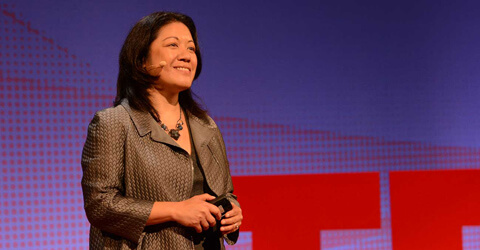Charlene Li is a Thought Leader for social media and emerging technologies which has been in the industry for the past two decades. She is the author of three business books and the founder of a consulting firm, the Altimeter Group, advising businesses on the impact of disruptive social technologies on their strategies, organizational thinking, and marketing efforts to revolutionize their companies’ face.
Charlene graduated magna cum laude from Harvard College and received her MBA from Harvard Business School. She founded and runs the Altimeter Group, a disruptive industry analyst firm that Prophet acquired in 2015. With over 20 years of tech and business experience, she is a respected advisor to Fortune 500 companies on digital transformation and leadership.
Charlene’s approach to helping businesses is to dig deep, identify the root cause and attack the problem.In her experience, many companies find themselves stuck in one place because they can’t get out of their way. She refers to these as “stuck organizations” since they’re essentially wired in old mindsets and need to shift to new mindsets and methods to take the company forward.
An example of the conflict between old mindsets and the need for modern methods can be seen in a report titled Deloitte’s Global Human Capital Trends. While employers’ intentions are sincere when it comes to engaging their employees, those intentions are rarely followed with action. According to this report, 84 percent of executives rate employee experience as necessary and 28 percent believe it’s among the top three issues for their businesses. However, only 9 percent feel they’re ready to address it.
Charlene talks about these emerging themes and concepts in her book, The Disruption Mindset: Why Some Organizations Transform While Others Fail. Her decades of experience in technology, media, and strategy are further enriched by interviews with some of the most forward-thinking leaders today.
Charlene’s passion in life is all about finding moments when genius strikes, as she explains, “But what I live and work for is creating the “A-ha Moment”. It happens when someone is thinking through a perplexing problem and then comes that moment of recognition and understanding. Light moves across their eyes, followed by a smile. They move from being in a place of confusion, where something is happening to them, to a place of understanding, where they have agency over their situation. Helping leaders take that first step to have a sense of empowerment and optimism, tempered by the knowledge of the journey ahead, is what drives my work.”
She is also a thought leader on social media use and advises businesses on which strategies to successfully adapt to meet their goals and objectives. She defines social media as “it is really around these technologies that allow people to connect. It’s much more than a technology that young people are using. It’s being used by so many people now that it’s becoming, like YouTube more than 50 per cent of the urban population is regularly using some online video. The difference, though is that, not everybody is necessarily creating the content. A lot of people are watching it, listening to it, and likely sharing it too. Especially small numbers of people who are actually creating the content, and I think most of us have probably someone to post the blog. Some of us may be very active in social networks, but we don’t really consider ourselves to be at this very top of the pyramid of people who are creating content. I don’t think you need to be. I think Social Media again is just media content information that is being shared by people with each other,” when the National Centre interviewed her for Women and Information Technology.
Based on her extensive research and enriching personal interactions with the most progressive thought-leaders in business, she has unravelled the secret of successful disruptive organizations. She has found one common ingredient in all disruptive organizations, she revealed in an interview, “And what I found is that these disruptive organizations, companies who have been able to drive exponential growth in change, they do one thing and one thing really, really well. And that is they focus on their future customer. And it sounds so simple. But really, ask yourself, do you know who your future customer is? Because if you don’t, then you won’t make the sacrifices, the investments, make the hard choices today to go after them in the future. And that’s the hardest part because if you’re a successful company, you have beautiful, profitable customers looking you in the face, saying, “come on, let’s do business together”. And to be disruptive, you have to say to them, “love you, I’ll serve you well, but my future lies elsewhere” and you’re going to turn part of your attention to that future as well.”
She has added many feathers to her hat, including being named one of the Top 50 Leadership Innovators by Inc. and one of the most creative business people by Fast Company.
She is also a board member in Jumpshot, Board of Directors, Audit Committee (2018-present),
Harvard University Alumni Association, Elected Member of the Board of Directors (2011-2014),
World Economic Forum’s Global Agenda Council on New Models of Leadership (2011-2013)
Charlene believes it’s the leader who has to take responsibility for their company and the disruptive patterns. As a leader, Charlene thinks every leader must think in a disruptive way to create change. She says, “And frankly, if you’re not creating change, you’re not a leader. You’re a manager.”
She further adds that her advice to leaders everywhere is, “There’s so many people who want to see and be leaders, then think about really how can you drive a huge amount of change because you’re quite capable of doing it. Your organization is capable of doing this too, as well. And don’t stop short. Disruption is completely within our grasp. So let’s go and get it.”







